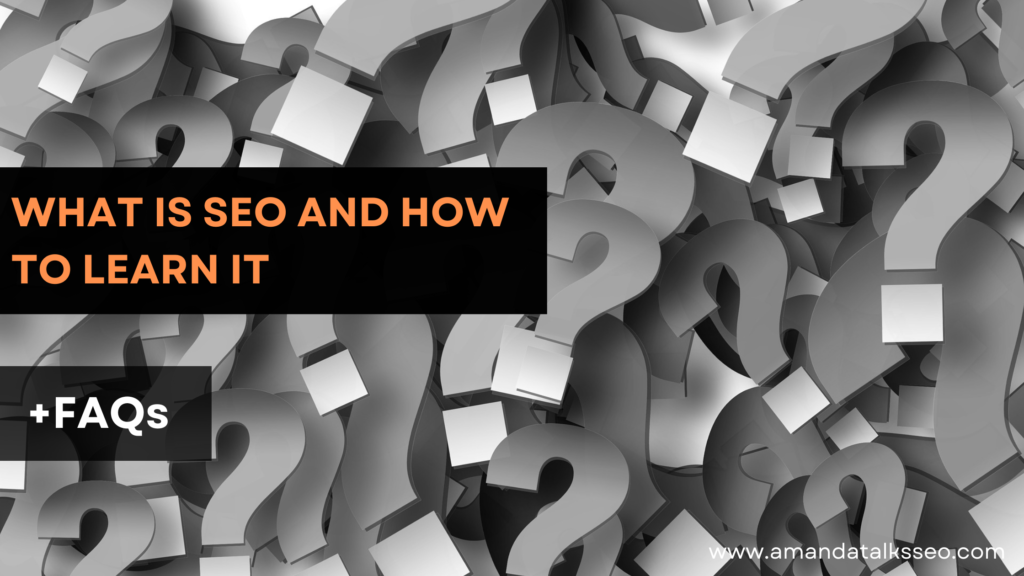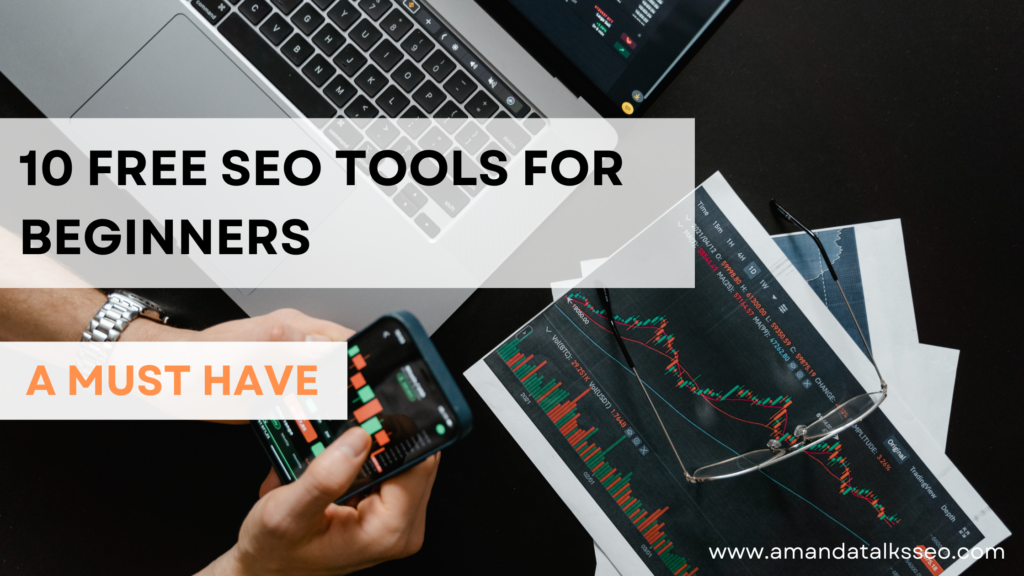“What is SEO and how to learn it?
Website owners, online marketers and anyone looking to improve their website’s visibility in search engines have asked this question at some point.
A few years back, I asked that question too.
6 months later, I got my clients startup website:
- 841 more organic clicks
- over 200k more impressions
- 84.3% of new visitors
- started acquiring backlinks for them
- and got them ranking on page 1 for 2 keywords
In this post, I’ll share everything you need to know about SEO and how to get started from my experience.
Table of Contents
How to Learn SEO for Beginners
There are terminologies you must familiarize yourself with to fully understand SEO.
In this post, I’ll go over a few. However, check out my SEO glossary containing 70+ terms for more familiarisation.
What is SEO and How to Learn It?
Search Engine Optimization, commonly known as SEO, is the process of optimizing (improving performance) a website or webpage to improve its ranking and visibility on search engines like Google, Bing, and Yahoo.
Let’s take a practical example:
Here’s a quick Google search on “how to make orange juice”
As you can see, there are over 1 billion pages available.
But between you and I,
Are we going to move past page 1 to get instructions on how to make orange juice?
No.
We’re going to click on the first or second result on page 1 and keep it moving.
This means that results that are on pages 3 and downward won’t get any visits.
This means that they’re not getting any traffic, conversion or any opportunity to make money.
This is the power of SEO – to get your website or webpage on page 1 and possibly the first position of search engines like Google.
Why Is SEO Important?
The goal of SEO is to increase the visibility of your website to potential customers by making it easier for search engines to find and rank your website.
By improving the visibility of a website or webpage on search engines, SEO helps businesses and individuals attract more organic traffic, leads, and sales.
Or simply put, SEO helps businesses and individuals make more money or spotlight opportunities to make more money by connecting them with the right audience.
Aspects of SEO
There are several aspects of SEO, including on-page optimization, off-page optimization and technical SEO.
1. On-page optimization
On-page optimization refers to the process of optimizing individual web pages on a website.
It includes various techniques and strategies that can be implemented directly on the web pages themselves to make them more search engine friendly.
Some common on-page optimization techniques include:
- Keyword research and optimization:
Identifying relevant keywords and optimizing the content on the web page to include those keywords in a natural way to improve the page’s relevance to search queries.
You should check out my blog on how to choose the best keywords for your website.
- Meta tags optimization:
Including relevant and optimized meta tags like title tags, meta descriptions, and header tags can improve the page’s visibility on search engines and provide information about the page’s content.
In my future blogs, I’ll teach you how to optimize your content. So be sure you don’t miss it.
- Internal linking:
Including internal links to other relevant pages on the website to improve the page’s relevance and help users navigate the website more easily.
- Image optimization:
Optimizing images by adding relevant alt tags, file names, and captions can improve the page’s ranking on search engines and help users find relevant images through image search.
- Page speed optimization:
Optimizing the page’s loading speed to improve user experience and reduce bounce rates.
2. Off-page optimization
Off-page optimization refers to the actions taken outside of a website to improve its visibility and ranking on search engines.
It involves optimizing factors that are not directly related to the website itself but can influence its ranking on search engines.
Off-page optimization is crucial for improving a website’s authority and credibility in the eyes of search engines, which can help to attract more organic traffic and improve search engine rankings.
Here are some common off-page optimization techniques:
- Link building:
Building high-quality backlinks to a website from other relevant and authoritative websites can improve its ranking on search engines. Link building involves outreach and networking with other websites to get them to link back to your site.
- Social media marketing:
Promoting the website on social media platforms like Facebook, Twitter, LinkedIn, and Instagram can help to increase its visibility and attract more organic traffic.
- Influencer marketing:
Collaborating with influencers in the relevant industry or niche to promote the website or its products/services can improve its visibility and credibility, and attract more organic traffic.
- Guest blogging:
Writing guest blog posts for other relevant and authoritative websites with a link back to your website can improve its authority and credibility, and attract more organic traffic.
- Brand building:
Building a strong brand presence and reputation through online and offline channels can help to improve the website’s authority and credibility, and attract more organic traffic.
3. Technical SEO
Technical SEO involves improving the technical aspects of a website to make it easier for search engine crawlers to crawl and index its pages, and to provide a better user experience for website visitors.
Here are some common technical SEO techniques:
- Website speed optimization: Optimizing the website’s loading speed can improve user experience and reduce bounce rates, which can have a positive impact on its ranking on search engines.
- Mobile optimization: Optimizing the website for mobile devices can improve its visibility on mobile search results and provide a better user experience for mobile users.
- Website architecture optimization: Optimizing the website’s architecture, navigation, and URL structure can make it easier for search engine crawlers to crawl and index its pages.
- Structured data optimization: Implementing structured data on the website can improve its visibility on search engines and provide additional information about its content to users.
- Duplicate content resolution: Resolving duplicate content issues can prevent search engines from penalizing the website and improve its ranking.
- HTTPS implementation: Implementing HTTPS can improve the website’s security and credibility, and can also improve its ranking on search engines.
How Can I Learn SEO?
Learning SEO and getting results isn’t impossible. After all, I did it.
Here are a few steps you can take to get started:
1. Understand the basics of SEO
Before you dive into the technical aspects of SEO, it’s essential to understand the basic principles and terminology.
Familiarize yourself with terms like keywords, meta tags, backlinks, and search engine algorithms.
You can find all these terms and more in my SEO Glossary.
You can also find a wealth of information on SEO basics right here on AmandaTalksSEO.
2. Stay up-to-date on industry news
SEO is a constantly evolving field, with new updates and changes to search engine algorithms happening all the time.
Make sure you stay up-to-date on the latest news and trends by following industry blogs and publications.
Would you like to receive industry news straight to your inbox?
3. Experiment with SEO tools
There are a variety of SEO tools available that can help you analyze and optimize your website or webpage.
Tools like Google Analytics, Google Search Console, and SEMrush can provide valuable insights into your website’s performance and help you identify areas for improvement.
I have a blog on 10 Free SEO Tools for beginners that you must check out. These tools helped me increase organic traffic by 313%
4. Practice on Your Own Website
The best way to learn SEO is to practice it yourself.
Start by optimizing your own website or blog, and experiment with different techniques to see what works best.
Keep track of your results and adjust your approach as needed.
5. Take an SEO course
If you’re serious about learning SEO, consider taking an online course or attending a workshop.
There are many reputable SEO courses available online, covering topics like keyword research, on-page optimization, link building, and more.
And if you’re interested, I could hold a workshop right here on AmandaTalksSEO specifically for you.
Just let me know in the comments.
6. Join SEO communities
Joining online communities and forums dedicated to SEO can be a great way to connect with other professionals in the field and learn from their experiences.
Look for groups on LinkedIn, Facebook, and Reddit. Be sure to keep up with me on LinkedIn.
7. Keep up with SEO Experts
In addition to my experience that I share for free on AmandaTalksSEO, I also interview SEO experts from time to time on the Wisdom Nuggets category which you must check out.
It’s an interview series featuring seasoned professionals across various fields as it relates to SEO.
These specialists are aspirational and full of valuable experience that can help you take your game to the next level.
Whether it’s learning from their successes or their mistakes, there’s always something to gain from tapping into the expertise of those who have been in the game for a while.
What is SEO and How to Learn It – FAQs
Is SEO Easy to Learn?
Yes and no. SEO is neither here nor there. It’s like learning any other thing. You encounter challenges but you overcome them. It all depends on the mindset you have.
How to learn SEO from scratch?
Luckily, many SEO specialists have created free courses and blogs you can learn from. I, specifically, have an entire website dedicated to learning SEO from scratch, so check AmandaTalksSEO out.
Can I learn SEO on my own?
Yes. While I don’t believe that any man is an island, learning without direct mentorship is possible. You can follow the weekly blogs I post here and practice them on your own website.

I believe that SEO goes hand in hand with content marketing and high-quality content writing.
So I’ve created these 2 categories to provide you with free information that’ll take you one step closer to your SEO goals.
Let me know in the comments what more you’d like to know about SEO.


